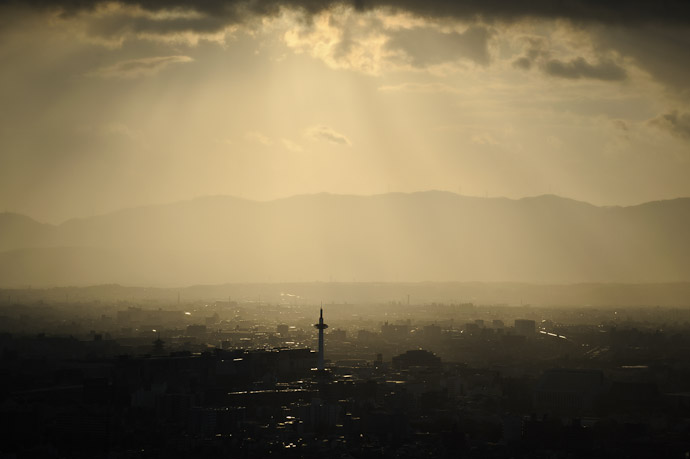
Nikon D700 + Voigtländer 125mm f/2.5 — 1/2000 sec, f/2.5, ISO 200 — map & image data — nearby photos
An Hour Before Kyoto's Sunset
a mostly-crisp view to Osaka 30 miles to the southwest
I mentioned in yesterday's post that the late-afternoon view was quite dynamic from eastern Kyoto's Shogunzuka Overlook, and I wasn't kidding. I'd never seen such a variety of conditions, much less over a mere hour and a half.
The view above is from when we got there an hour or so before sunset, toward Osaka. The air is crisp enough that you can see the picket-fence silhouette of Osaka's skyscrapers 30 miles away, yet somehow hazy enough in areas to be punctuated by colorful sunbeams. It was nice.
Yet, panning toward the right to look northwest instead of southwest, the view was wildly different:

Nikon D700 + Voigtländer 125mm f/2.5 — 1/400 sec, f/2.5, ISO 200 — map & image data — nearby photos
Creeping In
from the north
Lest you think I'm making this up, both photos above use the same white-balance treatment. The difference was really that dramatic.
Whatever was creeping in didn't seem quite like fog or haze... it looked more like smoke, I suppose... but whatever it was tag-teamed with the sun and some high clouds to make for some dramatic views I'd never seen.

Nikon D700 + Voigtländer 125mm f/2.5 — 1/8000 sec, f/2.5, ISO 200 — map & image data — nearby photos
Full-Color Monochrome
the city seems to be suddenly enveloping in a smoky fog
The photo above looks like it's been treated with some kind of sepia filter, but like all photos on this post, it's a normal full-color shot. It really did look that eerie.
But it was to get more eerie... almost gloomy...

Nikon D700 + Voigtländer 125mm f/2.5 — 1/4000 sec, f/2.5, ISO 200 — map & image data — nearby photos
Northwest Getting Gloomy

Nikon D700 + Voigtländer 125mm f/2.5 — 1/5000 sec, f/2.5, ISO 200 — map & image data — nearby photos
Medieval Haunted Look
The view in the picture above, facing almost the same as the first photo (but taken 15 minutes later), made me feel I was looking at some far-away place left deserted after decades of civil war, or some such scene. It was really eerie and unreal, and quite interesting.
The whole theme for the afternoon seemed to be that if you didn't like the view, wait five minutes and it would be completely different.
Indeed, not long after these shots were taken, the “smoky gloom” (whatever it really was) dissipated completely, leaving behind only a slight haze to be lit on fire by the backdrop of a setting sun, so by the time the group in yesterday's bride-at-sunset shot arrived twenty minutes later, there was nothing but brilliant jaw-dropping views.

Nikon D700 + Voigtländer 125mm f/2.5 — 1/5000 sec, f/2.5, ISO 200 — map & image data — nearby photos
Dedication
pro photographer lying down on the job
Now that I think about it, it was still fairly monochromatic, but just brilliant orange instead of gloomy dirty gray, so maybe the change wasn't as complete as I first thought. Still, one change in the color made for a 180-degree change in the mood.
The crows, ever active at dusk, were in fine form the whole time, gathering in the trees around the lookout and suddenly bursting forth in a noisy cacophony of wings and caws, only to eventually return and repeat again later. Here's one such burst, ten minutes after sunset when the orange was all but gone...

Nikon D700 + Voigtländer 125mm f/2.5 — 1/320 sec, f/2.5, ISO 4000 — map & image data — nearby photos
Crows after Sunset
Sometimes the best light of the evening explodes from nowhere just before civil twilight (10-15 minutes after sunset), so we waited around. it was darkening cold blue for most of the time, but eventually the sun gave up a last gasp in the form of a mild warm glow on the horizon:

Nikon D700 + Voigtländer 125mm f/2.5 — 1/320 sec, f/2.5, ISO 4000 — map & image data — nearby photos
Parting Twilight
15 minutes after sunset
It's wasn't at all the rare burst I'd hoped for, but it was better than nothing, and a fine cap to day.
I particularly like the first shot (#1607)!
Hi Jeffrey, these are some pretty amazing photos. I particularly like the first one.
I was curious about your camera settings, though. Why did you shoot wide-open for the first few shots? I can understand it for the later shots (due to lighting), but it seems that there was ample light in the beginning. Image sharpness and detail doesn’t seem to have suffered for it, which is fairly remarkable to me (not that I’ve ever tried, but it defies recommended practice). Was there a reason for it, or was it not particularly intentional?
It wasn’t intentional. Depth of field didn’t matter for that shot, so I should have stopped down for sharpness. A good photographer would have remembered. —Jeffrey
“Northwest Getting Gloomy” is something that I would like a print of (but rented walls are not mine to make holes in (well I could but then I would have to fill the holes & use matching paint eventually)).
“Medieval Haunted Look” goes with the previous one, just in another shade. It could be cropped from 20-some px above the tip of the distant hill|mountain to the bottom.